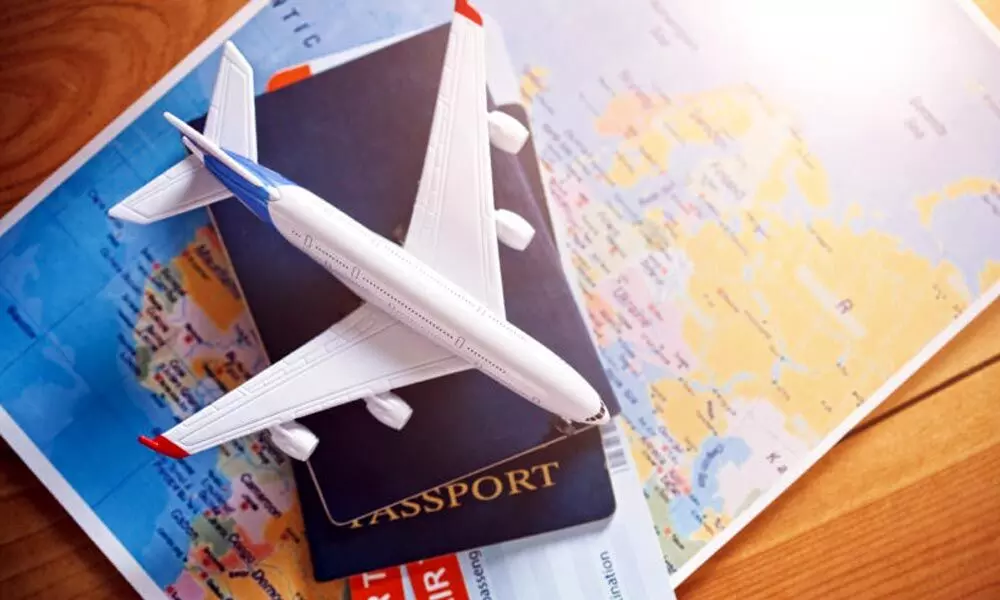Govt-imposed restrictions continue to hinder revival of intl travel
The financial losses of airlines globally have been close to a staggering figure of $370 billion. In India alone, last year losses have been close to $2.7 bn, almost Rs 19,000 cr
image for illustrative purpose

It is no secret that Covid-19 has devastated the aviation industry. In 2020, airlines globally lost $138 billion. Losses will reduce to $52 billion this year. And we expect a further reduction to a $12 billion loss in 2022. Add that up, and the toll that Covid-19 will take on industry finances tops $201 billion.
For the airlines based in this region we are estimating a cumulative loss of $5.6 billion for this year, with an improvement to $3.7 billion in losses for next year. The financial losses of airlines globally have been close to a staggering figure of $370 billion. In India alone, last year losses have been close to $2.7 billion, almost Rs 19,000 crore
Globally $243 billion was made available to airlines, of which $81 billion supported payrolls and approximately $110 billion was provided in the form of support that needs to be paid back. Sadly, in this region not a single government provided direct financial support to airlines. In most cases financial relief came in the form of deferred taxation or reduction or waiving of fees.
Willie Walsh, IATA's Director General said government-imposed restrictions continue to stop a revival of international travel, which remains 70 per cent down on pre-crisis levels. "The ICAO HLCC commitments show that governments understand what is needed to restart global connectivity," said Walsh. "The task now is implementation. Some governments have already started. The imminent opening of the US market to vaccinated travellers will be a big step forward. But we cannot let the output of this meeting remain as words on paper. The airline industry, 88 million livelihoods, 3.5 per cent of global GDP and billions of travellers are counting on governments to deliver on the risk-managed reopening of international travel."
We are seeing traffic steadily rebounding which shows that recovery is on its way. The last 18 months have made us realize just how important - indeed how precious - the ability to meet face-to-face is. And in doing so, we also have gained a renewed understanding of the role of aviation in our world. Our industry makes face-to-face possible. As efficient as technology like Zoom or Teams is – and I'll be honest I hate them – it's just no match for what we are doing now, adds Walsh. This crisis goes beyond any we have ever experienced before.
We are, however, past the worst point. And we can see a path towards normality. The cargo business is already operating at 8 per cent above pre-crisis levels. Air cargo has been a lifeline for many - delivering vaccines, PPE, medical equipment and even e-commerce. In doing so, it has also been the revenue star for many airlines in our industry.
Where governments have not restricted travel, the passenger business recovery has been swift. Domestic markets are expected to reach nearly 75 per cent of pre-crisis levels by the end of this year, but unfortunately international travel - where we see travel restrictions continue - is only expected to reach 22 per cent. Next year we expect domestic markets to be nearly where they were in 2019. But international travel will lag at just 44 per cent. IATA urged governments to use the commitments reached at the ICAO High Level Conference on Covid-19 (HLCC) to make progress toward restoring global air connectivity.
We are moving in the right direction, if not as fast as we would like to go. And the overall mood in the industry is one of cautious optimism. But the task ahead is formidable. 'We commit to taking effective measures to prevent the spread of SARS-CoV-2, the virus that causes Covid-19 and other communicable diseases by international air travel, in particular through the implementation of the ICAO CART guidelines, and encourage the harmonization of Member States' multilayer risk management strategies to safely restore international connectivity and support the revival of the global economy as a critical step towards achieving our goal to enhance the social, environmental and economic sustainability of aviation, ensuring the interoperability and mutual recognition of, and accessibility to, digital applications, secure transmission and validation of pandemic-related testing, vaccination and recovery certification that protects privacy and personal data.'
'We commit to promoting, to the greatest extent possible, a harmonized and inclusive approach to facilitate safe international air travel, including alleviating or exempting testing and/or quarantine requirements for fully vaccinated or recovered passengers, taking into account the different circumstances of individual States and their national policies, in keeping with WHO's policy and technical considerations for implementing a risk-based approach to international travel in the context of Covid-191 , and providing exceptions for non-vaccinated passengers.

